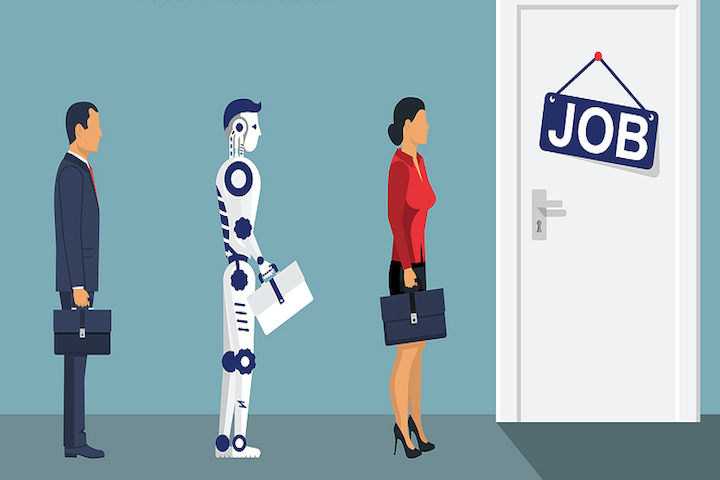The view from…
ResumeGiants:
We live in an age where technology is rapidly transforming every aspect of the workplace, and so the job application process is no exception. The advent of AI has ushered in a new era of job hunting, and job seekers are increasingly seeking out online resume builders.
Resume builders offer job seekers a range of features, from keyword optimization to tailored job descriptions, promising to give candidates an edge.
But it’s creating new questions for HR professionals sifting through what some now see as AI-enhanced applications.
A recent survey of HR managers revealed mixed feelings about AI-built resumes.
The major concern with AI-built resumes is the potential loss of the ‘personal touch.’ HR professionals value authenticity, seeking resumes that reflect a candidate’s true self.
The challenge with AI-generated content is ensuring it doesn’t come across as too generic or disconnected from the candidate’s real personality and experiences.
This concern is further amplified in industries where creativity and individuality are highly prized.
In certain fields, a resume is not just a summary of skills and experiences, but a reflection of a candidate’s unique approach and thinking style.
HR professionals in these sectors often look for hints of originality and personal flair, which can be difficult to discern in a resume formatted and optimized by AI.
AI can ‘polish and present’, but it can’t create the spark of individual creativity that we look for in our team members.
Does AI amplify candidates beyond what they are?:
Others argue that traditional resumes offer a better sense of the candidate’s individuality and effort. AI resumes – by their very nature – create a debate either about the authenticity of people’s accomplishments and/or their skills listed.
Quite rightly, there is concern candidates have over-relied on automated suggestions, leading to embellished or inaccurately represented skills.
By comparison, traditional resumes, handcrafted by the candidates, are often seen as more genuine, reflecting someone’s true effort to communicate their professional story. AI can help highlight key skills, but it can’t replace the human touch in understanding a candidate’s unique experiences.
Homogenization
What is arguably worse than all this though, is that there is a very real risk that AI-built resumes might lead to a homogenization of candidate profiles, making it challenging to distinguish one applicant from another.
This concern stems from the possibility that candidates using similar AI tools may end up with resumes that closely resemble each other, especially in terms of structure and keyword usage.
If there’s one thing HR professionals/recruiters value, it’s the ability of a resume to tell a coherent and compelling story of a candidate’s career journey. This narrative aspect is where AI-built resumes sometimes fall short.
While they can efficiently list skills and experiences, weaving them into a cohesive narrative that showcases a candidate’s growth and the challenges they’ve overcome, the fact is retelling a career trajectory demands a human touch.
This storytelling aspect is often what makes candidates stand out in a crowded field. It’s this that can be a deciding factor in the recruitment process.
So what does the future hold?
AI’s role in resume building is only set to grow. As such an evolution in HR practices is needed – for instance (and ironically) requiring HR to combat it with AI of their own – that which is capable of analyzing them better. A greater emphasis will be needed, for example, on deciphering AI-enhanced applications. In short, the traditional role of HR in initial resume screening could see a shift.
Benefits?
We’ve not yet talked about benefits, but it’s important we do. As AI technology continues to advance, for example, AI systems will be capable of producing much more personalized resumes, adapting not just to job descriptions but also to people’s individual career paths and aspirations. This could be regarded as a good thing.
As AI is used to look at resumes, the technology can potentially save hours of manual review time, allowing HR professionals to focus on the more nuanced aspects of recruitment, such as cultural fit and personal interviews.
Regardless of how a resume is built, HR professionals look for clarity, relevance, and evidence of skills and achievements. AI-built resumes can excel in these areas, especially when they’re fine-tuned to align with the job’s specific requirements.
But, and there is a big but. Care is needed too. The integration of AI in resume building also raises questions about the evolving role of HR in the recruitment process.
HR professionals need to adapt and develop new strategies for evaluating candidates in an AI-influenced landscape, where the line between human ingenuity and machine efficiency is increasingly blurred.
At the moment it’s clear that when comparing AI-built resumes with traditional ones, HR professionals are still divided. We find some say AI-enhanced resumes are more efficient, helping them quickly identify qualified candidates. However, others talk about resumes needing to reflect the candidate’s unique voice and experiences.
AI-built resumes are reshaping the job application landscape, offering both challenges and opportunities for HR professionals. While they bring efficiency and potential for better candidate-job matching, concerns about authenticity and over-reliance on technology persist.
As we navigate this new era, the balance between AI and the human element in recruitment will be crucial. The future of hiring lies not just in embracing technology but in harmonizing it with the irreplaceable value of human judgment.
What do other people say?

Paula Mathias-Fryer, a former head of HR, now senior director at SLO Partners, says, “When a resume appears to be entirely AI-generated, I tend to discard it. I prefer candidates who use their own words and skills to tailor their resumes.”

Matthew Warzel, founder of MJW Careers says: “A well-crafted resume and cover letter often provide valuable insights into a candidate’s communication skills, creativity, and authenticity. AI may not fully capture the candidate’s personality or the nuances of their career journey. Traditional resumes, on the other hand, tend to offer a more holistic view of the candidate, including their communication style and personal touch.”

Jennifer Preston,HR consultant, Flex HR says: “Job seekers who dig deep to capture the best part of themselves and the experiences that define who they are help separate a ‘prescriptive’ AI-generated resume from a human-crafted one.” She adds: “I don’t care to know how a computer values someone’d experiences. The words and language a candidate chooses reveal so much more about who they truly are.”

(HR practitioner quotes sourced with help from Resume Genius)
